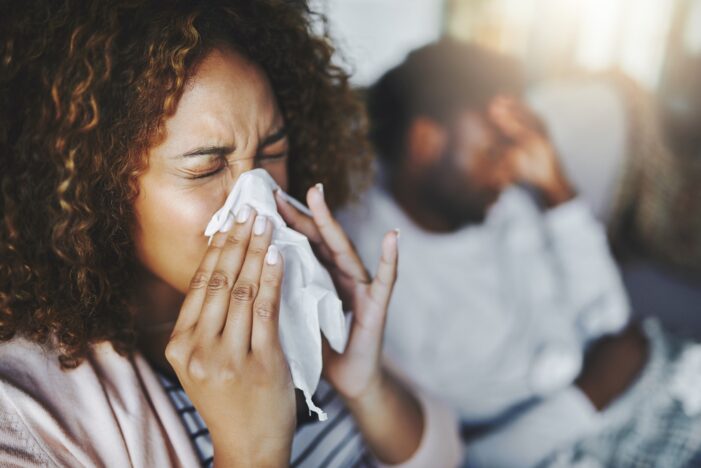As the weather cools and the days grow shorter, New Yorkers face the familiar challenge of staying healthy through flu season. This year, health officials are reminding residents that influenza, COVID-19, and RSV continue to pose serious risks—especially for children, older adults, and people with chronic health conditions.
Dr. Michelle Morse, Acting Commissioner of the New York City Department of Health and Mental Hygiene, emphasizes that “COVID-19, flu, and RSV can lead to severe illness and even death.” She notes that last year’s flu season was one of the deadliest in recent history, with 280 pediatric deaths nationwide—the highest in 15 years—and 89% of those children had not received a flu vaccine.
A Triple Threat: Flu, COVID-19, and RSV
The flu, COVID-19, and respiratory syncytial virus (RSV) spread primarily through droplets in the air when someone coughs, sneezes, or even talks. Once these droplets enter the eyes, nose, or mouth, infection can occur quickly—especially in crowded urban environments like subways, schools, and workplaces.
Dr. Morse explains that these viruses circulate most aggressively in the fall and winter, and that “the number one action you can take to protect your health this season is to get vaccinated.” Vaccines are a proven defense against hospitalization and death from all three viruses, and for most people, they can be received at the same time.
Who Should Get Vaccinated
Health officials recommend that everyone aged six months and older receive updated 2025–2026 flu and COVID-19 vaccines—even if they’ve had previous shots or past infections. For RSV, recommendations are more targeted:
• Adults age 75 and older should get an RSV vaccine.
• Adults ages 60–74 should consult their doctors about RSV vaccination if they have chronic conditions or live in long-term care facilities.
• Pregnant individuals should receive the RSV vaccine to protect newborns during their first RSV season.
• Infants can also receive preventive medication during their first RSV season (fall through spring).
Unlike the flu and COVID vaccines, repeat RSV vaccinations are not currently recommended once you’ve been immunized.
Common Symptoms and When to Seek Care
Early symptoms of flu, COVID-19, and RSV often overlap—fatigue, cough, sore throat, congestion, or fever—but each virus can progress differently. While most people recover with rest and hydration, Dr. Morse warns that treatment should not be delayed for those who test positive:
“COVID-19 and flu treatments such as oral antiviral pills reduce the risk of complications, hospitalization, and death. Treatment works better the sooner you start.”
Seek emergency care immediately if you or your child experiences:
• Difficulty breathing or persistent chest pain
• Blue or pale lips or face
• Confusion or extreme sleepiness
• Severe dehydration (dry mouth, few wet diapers, or dizziness)
• A fever lasting more than three days or above 104°F
Parents should also call their child’s doctor if there is poor feeding, unusual fussiness, or lethargy, particularly in babies under three months.
Practical Prevention Tips for Everyday New Yorkers
Vaccination is essential, but simple preventive steps make a big difference—especially in crowded areas like New York City.
• Stay home if you’re sick. Avoid infecting others by isolating when symptoms begin.
• Wear a well-fitted mask if you must be around others.
• Open windows or use fans to increase ventilation.
• Wash your hands often, and disinfect high-touch surfaces such as phones, door handles, and subway poles.
• Stay hydrated and get adequate sleep to keep your immune system strong.
Dr. Morse reminds residents that “staying home and taking steps to protect others in your household” can significantly reduce community transmission.
Access to Care for All New Yorkers
In a city as diverse as New York, access to care is a top priority. The Health Department and NYC Health + Hospitals provide resources regardless of insurance or immigration status.
If you don’t have a regular doctor, you can:
• Visit a nearby urgent care clinic or local pharmacy offering vaccines.
• Check your insurance plan for telehealth hotlines.
• Use NYC Health + Hospitals’ Virtual ExpressCare, available 24/7 at expresscare.nyc or by calling 631-EXP-CARE (631-397-2273).
These services provide low- or no-cost medical help in over 200 languages, ensuring every New Yorker can access life-saving care.
Dr. Morse affirms this commitment clearly:
“Payment, documentation, and housing status are not barriers to care. Every New Yorker can have access to lifesaving vaccines and health needs, without exception.”
Finding Vaccination Sites Near You
To locate a flu, COVID-19, or RSV vaccination site, visit the NYC Health Map at nyc.gov/health/map. Most sites welcome walk-ins, and many offer same-day appointments for multiple vaccines. Pharmacies, community centers, and local clinics throughout the five boroughs are stocked and ready for the 2025–2026 season.
Final Word
As Dr. Morse puts it, “the healthiest thing you can do this fall” is simple: get vaccinated, stay home when sick, and take small steps every day to protect your loved ones and your city.
In a place as vibrant and interconnected as New York, good health is a collective effort—and this flu season, it starts with you.

